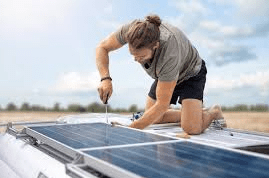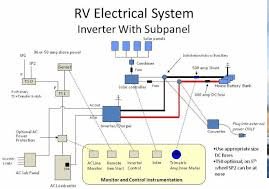The Ultimate Guide to RV Solar Installation
In the world of recreational vehicles (RVs), the pursuit of freedom and adventure is paramount. What better way to enhance your RV experience than by harnessing the power of the sun? RV solar installation is not just a green and sustainable choice; it’s a game-changer for your on-the-road lifestyle. In this comprehensive guide, we’ll walk you through the ins and outs of RV solar installation, providing you with everything you need to know to make an informed decision and embark on a solar-powered journey.

Why Go Solar in Your RV?
Cost Efficiency
The initial investment in RV solar installation may seem daunting, but it’s important to view it as a long-term investment. Once installed, solar panels can significantly reduce your reliance on expensive campsite hookups and generator fuel. In fact, many RVers find that solar panels pay for themselves within a few years through energy savings.
Environmental Benefits
Traveling in an RV often means getting closer to nature, and what better way to honor that connection than by using clean, renewable energy sources? Solar power reduces your carbon footprint, making your RV adventures more eco-friendly.
Off-Grid Freedom
One of the primary advantages of RV solar installation is the ability to go off-grid for extended periods. You can explore remote and beautiful locations without worrying about electrical hookups. With sufficient battery storage, you can enjoy creature comforts without limits.
Understanding RV Solar Systems
Solar Panels
Solar panels are the heart of your RV’s solar system. They capture sunlight and convert it into electricity. When choosing solar panels, consider factors such as their wattage, size, and efficiency. High-efficiency panels are generally smaller and produce more power per square foot.
Charge Controllers
Charge controllers regulate the voltage and current from your solar panels to prevent overcharging your batteries. There are two main types: PWM (Pulse Width Modulation) and MPPT (Maximum Power Point Tracking). MPPT controllers are more efficient and suitable for larger solar arrays.
Batteries
Your RV’s batteries store the energy generated by the solar panels. Deep-cycle batteries, such as AGM or lithium-ion, are the most suitable for this purpose. Proper battery maintenance is essential to ensure a long lifespan.
Inverters
Inverters convert DC (direct current) power from the batteries into AC (alternating current) power, which your RV appliances use. Pure sine wave inverters are recommended for sensitive electronics, ensuring a clean and stable power supply.
Wiring and Mounting
Proper wiring and mounting of solar panels are crucial for safety and efficiency. It’s advisable to consult a professional for installation to avoid any potential issues.
Calculating Your RV’s Solar Needs
Determining the right solar setup for your RV involves a few key considerations:
- Energy Consumption: Start by assessing your energy consumption. List all the appliances and devices you plan to power with solar, along with their wattage and daily usage.
- Sunlight Hours: Research the average daily sunlight hours in the regions you plan to travel. Solar output varies based on location and season.
- Battery Capacity: Calculate the amount of energy you need to store in your batteries to meet your daily consumption during non-sunlight hours.
- Solar Panel Capacity: Based on your daily energy consumption and sunlight hours, determine the number and wattage of solar panels required.
DIY vs. Professional Installation
While some RV enthusiasts opt for a DIY approach to save money, professional installation has its advantages. An experienced installer can ensure your system is safe, efficient, and optimized for your specific RV. Plus, they can handle all the technical aspects, saving you time and potential headaches.
Maintaining Your RV Solar System
Regular maintenance is crucial to keep your RV solar system running smoothly. Here are some essential maintenance tasks:
 Panel Cleaning: Clean your solar panels regularly to remove dust, dirt, and debris, which can reduce their efficiency.
Panel Cleaning: Clean your solar panels regularly to remove dust, dirt, and debris, which can reduce their efficiency.- Battery Care: Check your batteries for proper water levels (for lead-acid batteries) and ensure they are securely connected.
- Inverter Inspection: Periodically inspect your inverter for signs of damage or overheating.
- Controller Check: Monitor your charge controller for any error codes or irregularities.
Conclusion
Embarking on the journey of RV solar installation is a significant step toward a more sustainable, cost-efficient, and independent RV lifestyle. By harnessing the power of the sun, you can explore remote destinations and enjoy the freedom of off-grid adventures. Remember that the right system for your RV depends on factors like energy consumption, location, and personal preferences. Whether you choose a DIY approach or opt for professional installation, the rewards of RV solar power are well worth the investment.
you need to explore more then visit here


 Panel Cleaning: Clean your solar panels regularly to remove dust, dirt, and debris, which can reduce their efficiency.
Panel Cleaning: Clean your solar panels regularly to remove dust, dirt, and debris, which can reduce their efficiency.